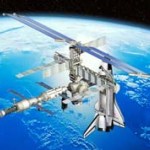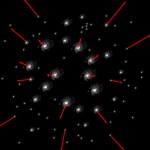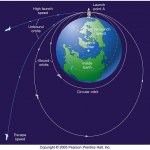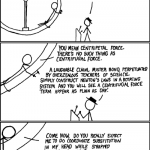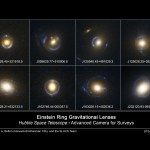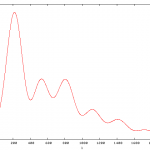gravity
Ever get sick of your life here on Earth? What about really getting away from it all; what if you wanted to live in space, orbiting the Earth, away from everyone. (At least for awhile, like a summer home.) What would you need to do it, and what would it consist of?
I propose an idea which I'll call a "space house," where I'll go through what I think is the cheapest and easiest way to get all the things you would need to comfortably survive in space for an extended period of time. First off, let's go over all the things a human would need to survive, while still having a good life, in space…
The Universe isn't a static place. Although the laws of nature (physics, chemistry, biology, etc.) don't appear to change over time, everything in the Universe appears to evolve, and changes over time. One of the simplest ways that this happens is through Hubble expansion.
General relativity tells us how the Universe expands, and more specifically, it tells us that the expansion rate (which we call the Hubble constant, H0) is related to the total energy density of the Universe. More matter density: faster expansion. Greater density of photons (i.e., light): faster expansion. More of any and…
You and I have lived on planet Earth long enough to know that if you want to launch something into space, it needs to travel fast enough to escape the pull of Earth's gravity. Launch it with too slow of a speed, and it crashes back into Earth. Launch it with a little more speed, and you can send it into orbit (like a satellite). But launch it fast enough, and it can escape from Earth's gravity altogether. The speed to completely escape from Earth's gravity is pretty fast: about 11.2 km/s, or 7 miles per second!
Make something denser and more massive, and you'll have to go faster and faster…
Last year, I had just finished my Ph.D. studies, and had moved to Madison, WI to teach introductory physics at the University of Wisconsin. I was working on this paper, and when I submitted it, I got a phone call from New Scientist magazine's space division.
Fast-forward two weeks, and I find this article online, where I got to see my name in print:
Now, scientists led by Ethan Siegel of the University of Wisconsin, in Madison, US, have come up with a new way to potentially reveal blobs of dark matter drifting nearby and perhaps even pin down what it is once and for all.
And I thought to…
One of the worst teaching tools physicists use (and they almost all do it) is to tell students,
There's no such thing as centrifugal force.
What can you do when the top physics education website says, "It is important to note that the centrifugal force does not actually exist. We feel it, because we are in a non-inertial coordinate system." There's a very funny comic over at xkcd that goes as follows:
Well, what's the deal? What really goes on, physically, and what causes a centrifuge to work? Is your physics teacher right, or is there more to the story than "the centrifugal force does not…
One of the perks of being a postdoc at a place like the University of Arizona, one of the top places in the US for astronomy, is that we get a number of really interesting visitors. Today we got paid a visit by Tommaso Treu, an astronomer at UC Santa Barbara.
He spoke to us today about one of his most recent, most interesting discoveries, done with the Hubble Space Telescope, of a double Einstein Ring. Take a look at the image below:
You'll notice that there's a ball of light in the center with some ring-like structure(s) around it. These things are rare, first off. There are only two ways…
The first serious advocate of modifying Newton's laws instead of postulating unseen (or dark) matter was Moti Milgrom, from whom today a new article appears on the astrophysics preprint archives.
In particular, Milgrom asserts the following:
MOND predictions imply that baryons alone accurately determine the full field of each and every individual galactic object. These predictions are contrary to the expectations in the DM paradigm in view of the following:
a. the haphazard formation and evolution of galactic objects,
b. the very different influences that baryons and DM are subject to during…
